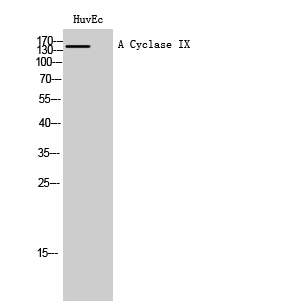
| WB | 咨询技术 | Human,Mouse,Rat |
| IF | 咨询技术 | Human,Mouse,Rat |
| IHC | 1/100-1/300 | Human,Mouse,Rat |
| ICC | 技术咨询 | Human,Mouse,Rat |
| FCM | 咨询技术 | Human,Mouse,Rat |
| Elisa | 1/10000 | Human,Mouse,Rat |
| Aliases | ADCY9; KIAA0520; Adenylate cyclase type 9; ATP pyrophosphate-lyase 9; Adenylate cyclase type IX; Adenylyl cyclase 9 |
| Entrez GeneID | 115; |
| WB Predicted band size | 150kDa |
| Host/Isotype | Rabbit IgG |
| Antibody Type | Primary antibody |
| Storage | Store at 4°C short term. Aliquot and store at -20°C long term. Avoid freeze/thaw cycles. |
| Species Reactivity | Human |
| Immunogen | Synthesized peptide derived from the N-terminal region of human A Cyclase IX. |
| Formulation | Purified antibody in PBS with 0.05% sodium azide,0.5%BSA and 50% glycerol. |
+ +
以下是关于碳酸酐酶IX(CAIX,可能为用户所指的A Cyclase IX)抗体的3篇代表性文献,按发表时间排序:
---
1. **文献名称**: *Cloning and characterization of MN, a human tumor-associated protein with a domain homologous to carbonic anhydrase and a putative helix-loop-helix DNA binding segment*
**作者**: Pastoreková S, et al.
**摘要**: 该研究首次克隆并鉴定了CAIX(原名MN蛋白),发现其在多种肿瘤中高表达,而在正常组织中受限。揭示了CAIX的结构包含碳酸酐酶催化域,为后续抗体开发奠定基础。
---
2. **文献名称**: *Antibody validation in tissue samples by comparing with quantum dot staining and real-time PCR in renal cell carcinoma*
**作者**: Oosterwijk E, et al.
**摘要**: 研究验证了抗CAIX单克隆抗体(如G250)在肾细胞癌诊断中的特异性,证实其通过靶向CAIX的细胞外结构域实现肿瘤靶向成像及治疗应用。
---
3. **文献名称**: *Hypoxia-inducible carbonic anhydrase IX and XII promote tumor cell growth by counteracting acidosis through regulation of the intracellular pH*
**作者**: Chiche J, et al.
**摘要**: 阐明CAIX在肿瘤缺氧微环境中通过调节细胞内pH值促进肿瘤存活,证明抗CAIX抗体可抑制肿瘤细胞适应酸性环境,提示其治疗潜力。
---
**备注**:若需最新研究(如2020年后),可补充靶向CAIX的抗体偶联药物(ADC)或免疫治疗相关文献。
**Background of Adenylate Cyclase IX (AC IX) Antibody**
Adenylate cyclase IX (AC IX), encoded by the *ADCY9* gene, is a membrane-bound enzyme that catalyzes the conversion of ATP to cyclic AMP (cAMP), a critical secondary messenger in cellular signaling. As a member of the adenylate cyclase family, AC IX is regulated by G-protein-coupled receptors (GPCRs) and plays roles in modulating physiological processes such as hormone response, neurotransmission, and metabolic regulation. Unlike other isoforms, AC IX exhibits distinct tissue expression patterns, with higher levels observed in the brain, kidney, and cardiovascular system, suggesting specialized functions in these tissues.
AC IX antibodies are essential tools for studying the enzyme’s expression, localization, and activity in both normal and pathological contexts. These antibodies are typically developed using immunogenic peptides or recombinant proteins, enabling specific detection in techniques like Western blotting, immunohistochemistry (IHC), and immunofluorescence (IF). Research highlights AC IX's involvement in diseases, including cancer, where dysregulated cAMP signaling may influence tumor progression, and cardiovascular disorders linked to altered adrenergic signaling. Additionally, AC IX has been explored as a potential therapeutic target, particularly in conditions associated with cAMP pathway imbalances.
The availability of specific AC IX antibodies supports ongoing investigations into its mechanistic roles and therapeutic relevance, bridging molecular biology with clinical research.
×